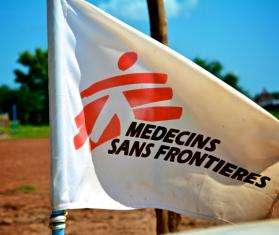Doctors Without Borders/Médecins Sans Frontières (MSF) is working with Ukraine's Ministry of Health to treat people wounded in a deadly attack yesterday on a marketplace in Kostiantynivka, in the Donetsk region of Ukraine, as the war continues to increase medical needs in the area.
MSF staff work in the surgical and intensive care unit of Kostiantynivka hospital, supporting the Ministry of Health in treating people wounded in frequent attacks on the area. A total of 34 patients were admitted after yesterday's blast, 15 of whom required immediate lifesaving care.
“I was called urgently to the hospital," said IIya Bilokonov, MSF anesthesiologist. "When we arrived, there were many wounded people in all the rooms and the corridor. Most were seriously injured—they had mine-explosive injuries and burns. All trauma surgeons were working, all operating theaters were full. Unfortunately, attacks on civilians and civilian infrastructure occur often here.

In yesterday's attack, at least 17 people were reported to have been killed, including a child. Five patients were immediately transferred to the operating room for emergency surgery, and MSF also transported four patients in critical condition from Kostiantynivka to Dnipro by ambulance, to receive specialized treatment. One was a young woman who required mechanical ventilation support and continuous medical care due to a penetrating abdominal injury, chest trauma, pneumothorax and massive blood loss. The patients’ mother, Inna, said her daughter was working as a market seller when the attack occurred.
“I heard a rocket flying,” Inna said. "I was thrown back by the blast wave. When I got up, I immediately ran to the market. I felt the danger in my heart. She was lying between two broken cars—the cars were burning. I started screaming. Passersby ran up and pulled my daughter out.”
Intense strikes and explosions in the town and surrounding suburbs of Kostiantynivka have become an almost daily reality. It lies about 12 miles west of the frontline сity of Bakhmut, a major flashpoint in the war. As the battle line encroached, the level of risk for people in Kostiantynivka and the surrounding areas has grown. Since MSF began supporting Kostiantynivka hospital in August 2022, more than 1,800 patients have been admitted to the emergency department, most often with trauma injuries from shelling, bombing or shrapnel.

MSF staff transfer a patient in critical condition from the Kostiantynivka hospital to medical facilities in Dnipro to receive specialized treatment.
Ukraine 2023 © Yuliia Trofimova/MSF

As of September 2023, almost 3,500 patients have been transferred from the east to the west of Ukraine by MSF medical evacuation train since the escalation of the war in 2022.
Ukraine 2023 © Linda Nyholm/MSF
Kostiantynivka hospital is one of the few functional health care facilities near the eastern front lines. Due to numerous medical facilities in the neighboring towns being either destroyed or closed and people in the area—including medical staff—having to flee, Kostiantynivka hospital now also serves patients from across the district.
"The situation is very challenging—hospitals and medical staff are working under difficult conditions,” said Virginia Moneti, MSF project medical referent.
With the near-constant shelling and sound of alarms, going to see the doctor now requires a careful calculation of risk. Many people who have remained in the vicinity are older adults living with chronic health conditions. To ensure continuity of care, MSF teams are running mobile clinics in villages close to Kostiantynivka, providing both physical and mental health care services.

Treating the psychological wounds of war in Ukraine
Read moreAs fighting grinds on in the Donetsk region, MSF teams continue to support the Ukrainian health care system—which is responding to the huge needs, under harsh conditions near the front lines—by filling in the gaps that have been caused and aggravated by the war. From May to July 2023, MSF conducted nearly 10,000 medical consultations and almost 800 psychological sessions via mobile clinics in Donetsk region.
Working near the front lines in the Donetsk, Kherson, Dnipropetrovsk and Zaporizhzhia regions, MSF ambulances have also transported more than 6,968 patients since the escalation of the war last year, with approximately 60 percent of these patients suffering from violent trauma. A further 3,489 patients have been transferred from the east to the west of Ukraine by MSF's medical evacuation train.
MSF has also recently started supporting Selydove Hospital in Donetsk region, with anesthesiologists and a surgeon.




